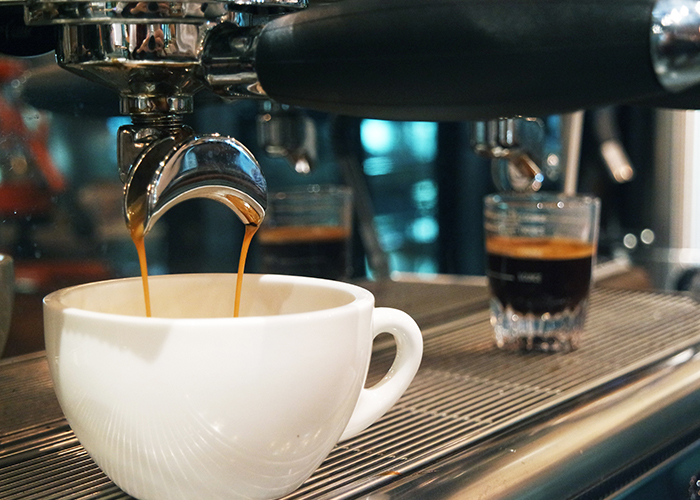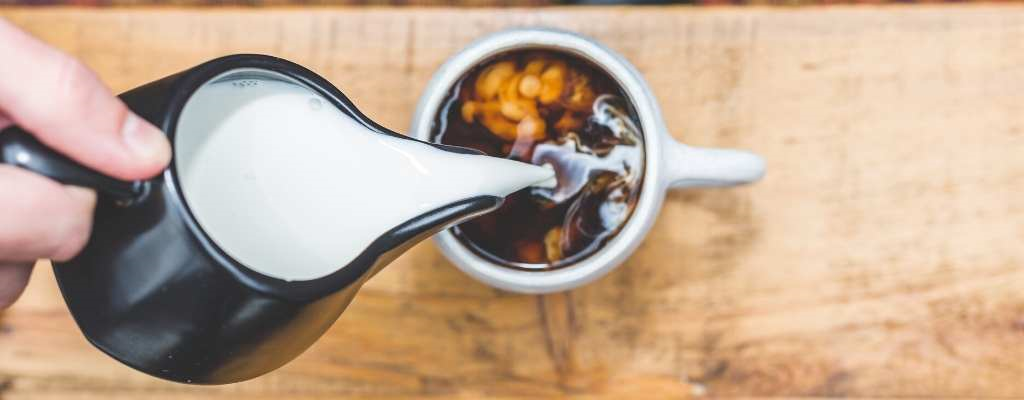What is the BEST MILK for Coffee? Delve into the World of Coffee Excellence.
Introduction
Coffee is a beloved beverage enjoyed by millions of people worldwide, and it’s no surprise that the choice of milk to accompany your coffee can significantly impact the overall taste and texture of your brew. Whether you prefer a traditional espresso or a creamy latte, the type of milk you use can make or break your coffee experience. In this comprehensive guide, we’ll explore the various types of milk popular in coffee-making, discuss the qualities desired when selecting milk for espresso, and help you find the best milk to elevate your coffee to new heights.

Types of Milk Popular in Coffee.
- Whole Milk:
- Whole milk is a classic choice for coffee enthusiasts. It has a rich, creamy texture due to its higher fat content, which helps create a smooth and indulgent coffee experience.
- The fats in whole milk complement the bitterness of coffee, resulting in a well-balanced cup.
- The creaminess of whole milk makes it ideal for espresso-based drinks like lattes and cappuccinos, where frothing and latte art are essential.
- 2% (Reduced-Fat) Milk:
- 2% milk offers a slightly lighter option while still providing a decent amount of creaminess.
- It’s a popular choice for those looking to reduce calorie and fat intake while maintaining a creamy texture in their coffee.
- Skim Milk (Fat-Free):
- Skim milk is virtually fat-free, making it the lightest option among dairy milk varieties.
- While it lacks the creaminess of whole milk, it’s a good choice for those who prefer a coffee with fewer calories and fat.
- Non-Dairy Milk Alternatives:
- With the rise of dairy-free diets and lactose intolerance awareness, non-dairy milk alternatives have gained popularity in coffee-making. Some of the most popular options include:
- Almond Milk: Known for its nutty flavor and slightly sweet profile, almond milk is a great choice for adding a unique taste to your coffee.
- Soy Milk: Soy milk is known for its creamy consistency and neutral flavor, making it a versatile option for various coffee recipes.
- Oat Milk: Oat milk has a naturally sweet flavor and a creamy texture, making it an excellent dairy substitute for coffee lovers.
- Coconut Milk: Coconut milk adds a tropical twist to your coffee with its rich and coconutty taste.
- Cashew Milk: Cashew milk offers a velvety texture and a subtle nutty flavor, enhancing the overall coffee experience.
- With the rise of dairy-free diets and lactose intolerance awareness, non-dairy milk alternatives have gained popularity in coffee-making. Some of the most popular options include:
The Best Traditional Dairy Milk for Coffee.
When it comes to traditional dairy milk for coffee, whole milk is often considered the best choice by many coffee enthusiasts. Here’s why:
- Creaminess: Whole milk contains a higher fat content, which lends a luxurious creaminess to your coffee. This creaminess complements the bitterness of coffee, resulting in a well-balanced and satisfying cup.
- Frothing Ability: Whole milk is excellent for frothing and creating microfoam, essential for crafting latte art and achieving that velvety texture in espresso-based drinks like lattes and cappuccinos.
- Balance: The fats in whole milk help mellow the acidity and bitterness of coffee, creating a harmonious flavor profile.
However, the “best” milk for your coffee ultimately depends on personal preference. Some individuals may prefer the lighter taste of 2% milk or opt for non-dairy alternatives due to dietary restrictions or taste preferences. The best milk for your coffee is the one that aligns with your taste and dietary requirements.
Qualities Desired in Milk for Espresso.
When selecting milk for making espresso, whether you’re preparing a straight shot or a milk-based espresso drink like a latte or cappuccino, certain qualities are desired to enhance the coffee experience:
- Freshness: Fresh milk is crucial for the best coffee experience. Check the expiration date and use milk that’s within its recommended shelf life to avoid off-flavours or spoilage.
- Temperature: Milk should be steamed to the right temperature (typically between 150-155°F or 65-68°C). Steaming milk too hot can scald it and alter the flavor.
- Microfoam: For milk-based espresso drinks, achieving microfoam is essential. Microfoam is a velvety, fine-textured foam that enhances the overall mouthfeel of the drink and allows for latte art.
- Sweetness: High-quality milk, especially whole milk, can have a natural sweetness that complements the coffee’s flavor. Look for milk with a pleasant, sweet taste.
- Consistency: Milk should be consistently textured and free of large bubbles or lumps when frothed. Properly steamed milk should have a silky, paint-like texture.
- Creaminess: Creaminess is key, especially for lattes and cappuccinos. The milk should blend seamlessly with the espresso to create a harmonious, well-balanced drink.
In the world of coffee, the choice of milk is a highly personal decision that can significantly impact your coffee experience. Whether you prefer the creaminess of whole milk, the lighter taste of 2% milk, or the versatility of non-dairy alternatives, there’s no one-size-fits-all answer to the question of the best milk for coffee. Ultimately, it comes down to your taste preferences, dietary needs, and the specific coffee drink you’re preparing.
When selecting milk for espresso, prioritize freshness, proper steaming temperature, microfoam quality, sweetness, and consistency to ensure a delightful coffee experience. Experiment with different milk types to discover your favourite combination and elevate your coffee game to new heights. Remember, coffee is a journey, and the quest for the perfect cup is all part of the adventure.
Keurig K-Express Coffee Maker, Single Serve K-Cup Pod Coffee Brewer, Black.
Green Mountain Coffee Roasters Breakfast Blend Single-Serve Keurig K-Cup Pods, Light Roast Coffee, 24.
Keurig K-Duo Single Serve K-Cup Pod & Carafe Coffee Maker, Black.
Selecting the Best Non-Dairy Milk Alternative for Coffee.
Non-dairy milk alternatives have gained immense popularity in recent years, thanks to the growing interest in plant-based diets, lactose intolerance awareness, and a desire for unique flavour profiles. While non-dairy milk options can be a great addition to your coffee, it’s essential to understand how they affect the flavour of espresso and whether they require different temperatures for the best results. Additionally, we’ll discuss whether non-dairy milk alternatives are significantly more expensive than traditional dairy options.
- Almond Milk:
- Flavor Profile: Almond milk has a nutty and slightly sweet flavor. It can add a pleasant, mild nuttiness to your coffee, enhancing its overall taste.
- Temperature: Almond milk can be heated to the same temperature as regular milk (around 150-155°F or 65-68°C) for espresso-based drinks.
- Cost: Almond milk is often slightly more expensive than cow’s milk, but the price difference is usually not significant.
- Soy Milk:
- Flavor Profile: Soy milk has a relatively neutral flavor that blends well with coffee. It is creamy and may add a subtle bean-like note.
- Temperature: Soy milk can be heated to the same temperature as cow’s milk for espresso-based drinks.
- Cost: Soy milk is competitively priced and often comparable to cow’s milk in terms of cost.
- Oat Milk:
- Flavour Profile: Oat milk is naturally sweet and has a creamy texture. It can provide a pleasant, velvety mouthfeel to your coffee.
- Temperature: Oat milk is known for its ability to froth well at lower temperatures (around 130-140°F or 54-60°C). This makes it an excellent option for lattes and cappuccinos.
- Cost: Oat milk is often slightly more expensive than cow’s milk, but the difference in price is usually reasonable.
- Coconut Milk:
- Flavor Profile: Coconut milk has a rich and tropical coconut flavor. It can be a unique addition to your coffee, especially if you enjoy a hint of coconut.
- Temperature: Coconut milk can be heated to the same temperature as cow’s milk, but it may separate at higher temperatures, so it’s essential to monitor it closely.
- Cost: Coconut milk can be more expensive than cow’s milk, depending on the brand and quality.
- Cashew Milk:
- Flavour Profile: Cashew milk has a mild and slightly nutty flavour. It provides a creamy texture without overpowering the coffee’s taste.
- Temperature: Cashew milk can be heated to the same temperature as cow’s milk for espresso-based drinks.
- Cost: Cashew milk can be slightly more expensive than cow’s milk, but the price difference is generally reasonable.
Non-dairy milk alternatives offer a wide range of flavour profiles, and the choice depends on your personal taste preferences and dietary restrictions. While they may have different flavour effects on espresso, they can all contribute to creating a delicious and unique coffee experience.
Regarding cost, non-dairy milk alternatives can be more expensive than traditional dairy milk, but the price difference varies depending on factors like brand, region, and packaging. It’s essential to consider your budget and weigh the cost against your desire for a dairy-free or plant-based option. Many coffee shops and cafes now offer a choice of non-dairy milk alternatives for an additional charge, reflecting the higher cost of these products.
In conclusion, the best non-dairy milk for coffee depends on your flavour preferences and dietary needs. These milk alternatives can add depth and uniqueness to your espresso-based drinks. While they may require slightly different temperatures for optimal results, they are generally suitable for most coffee applications. As for cost, while non-dairy milk alternatives can be pricier, the difference in price is often justified by the benefits they offer to those seeking dairy-free or plant-based options in their coffee. Ultimately, experimenting with different non-dairy milks can lead to discovering your favourite coffee combination that suits your taste buds and values.
What is the cost difference compared to traditional dairy milk & nontraditional barista milks?
The cost difference between traditional dairy milk and nontraditional barista milks in coffee shops can vary depending on several factors, including the location, brand, and type of milk alternative. Here are some general insights into the cost differences:
- Traditional Dairy Milk (Cow’s Milk):
- Traditional dairy milk is typically one of the most affordable options for coffee shops.
- The price of cow’s milk can vary depending on factors such as location and sourcing (organic vs. conventional).
- In many coffee shops, it may be the default milk option and is often included in the base price of coffee drinks.
- Nontraditional Barista Milks (Non-Dairy Alternatives):
- Non-dairy alternatives like almond, soy, oat, coconut, and cashew milk are typically more expensive than traditional dairy milk.
- The cost of non-dairy milks can vary significantly based on brand, quality, and region.
- In coffee shops, non-dairy milk options are often available for an additional charge, which can range from $0.50 to $1.00 or more per drink, depending on the location and the type of non-dairy milk selected.
- Some high-end coffee shops or specialty cafes may charge a premium for non-dairy milk alternatives due to the added cost and demand.
- Oat Milk as a Popular Non-Dairy Option:
- Oat milk, in particular, has gained popularity among coffee enthusiasts and is frequently offered as a non-dairy option in coffee shops.
- Oat milk tends to be competitively priced compared to other non-dairy alternatives, making it a popular choice for both customers and coffee shop owners.
It’s important to note that the cost difference between traditional dairy milk and non-dairy alternatives can also be influenced by the region or country you’re in. Some regions may have higher prices for certain milk types due to availability and production costs.
Ultimately, while non-dairy alternatives may come at a premium in coffee shops, many customers are willing to pay extra for the added choice, dietary considerations, and flavour profiles they offer. The cost difference is generally seen as a worthwhile investment by those who prefer or require non-dairy options in their coffee. Additionally, the price variation between different milk types and brands emphasizes the importance of exploring various options to find the one that suits both your taste and budget.
Author
Brendon McAliece is a multi-lingual expat who brings over three decades of flight simulator/PC building experience as well as over two decades of real-world jet fighter experience as a weapons/egress technician. He holds a sport pilot certificate giving him real-world flying experience. Hi travels have taken him from Europe to the Middle East, Asia and his home of Australia. He has a passion for travel, languages, Flight simulation as well as Guitaring and Coffee. You can read more in his blogs below.

Learn more @
DreamingGuitar.com – DreamingCoffee.com – LetsFlyVFR.com
Home – Blog – Shop – About
As an Amazon affiliate I may earn on qualifying sales.





